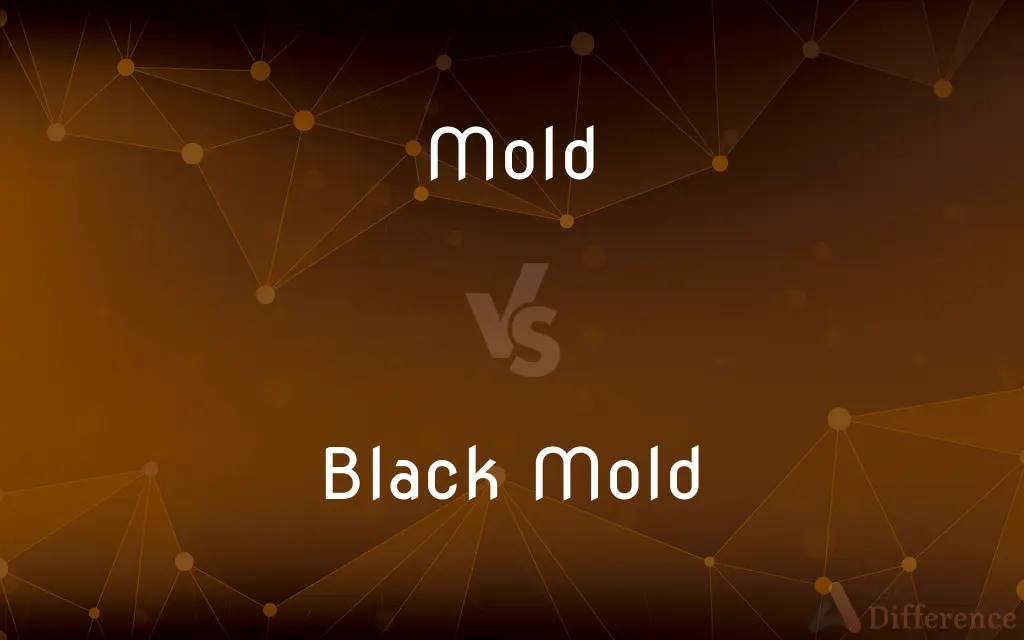Mold vs. Black Mold — What's the Difference?
Edited by Tayyaba Rehman — By Fiza Rafique — Published on December 22, 2023
Mold is a general term for fungi growing multicellular filaments, while Black Mold specifically refers to toxic molds, primarily Stachybotrys chartarum.

Difference Between Mold and Black Mold
Table of Contents
ADVERTISEMENT
Key Differences
Mold and Black Mold both refer to fungal growths, but they differ significantly in their implications, especially regarding health concerns. Mold is a generic term, covering various fungi that proliferate in damp environments. Black Mold, on the other hand, is often the label for molds that produce mycotoxins, potentially hazardous to health.
The presence of Mold is quite common in many households, especially in places with high humidity. Most molds are harmless in small quantities and might just be a sign of a moisture problem. However, Black Mold, specifically Stachybotrys chartarum, raises more alarms due to its potential health risks when inhaled.
Mold can appear in different colors - white, green, yellow, or even blue. Its growth usually indicates prolonged dampness. Black Mold, despite its name, isn't always black. It can sometimes appear greenish-black and has a slimy texture when it's moist and a powdery texture when it's dry.
Removing Mold generally requires basic cleaning techniques. It's essential to address the underlying moisture issue to prevent its recurrence. Eradicating Black Mold, however, might necessitate more specialized cleaning methods and even professional assistance due to the health risks it poses.
To summarize, while Mold is a broad term that encompasses various fungi, Black Mold is more specific and is particularly concerning due to the potential health hazards it presents.
ADVERTISEMENT
Comparison Chart
Definition
Fungal growth in multicellular filaments.
Toxic molds, mainly Stachybotrys chartarum.
Color Range
Can be white, green, yellow, blue, etc.
Usually greenish-black.
Associated Risks
Mostly harmless, indicates moisture.
Potentially hazardous to health.
Texture
Varies, often fuzzy.
Slimy when wet, powdery when dry.
Removal
Basic cleaning methods.
May require specialized methods or professionals.
Compare with Definitions
Mold
Fungi forming multicellular filaments.
Mold grew on the bread that was left out too long.
Black Mold
Requires particular conditions to grow.
Black Mold thrives in damp, dark, and warm environments.
Mold
A hollow form or matrix for shaping a fluid or plastic substance.
Black Mold
Toxic mold, primarily Stachybotrys chartarum.
Black Mold is a concern in water-damaged homes.
Mold
A frame or model around or on which something is formed or shaped.
Black Mold
Greenish-black in appearance.
The slimy patch on the wall turned out to be Black Mold.
Mold
Something that is made in or shaped on a mold.
Black Mold
Can produce mycotoxins.
The danger of Black Mold lies in the mycotoxins it can produce.
Mold
The shape or pattern of a mold.
Black Mold
Potential health risks when inhaled.
Exposure to Black Mold can cause respiratory issues.
Mold
General shape or form
The oval mold of her face.
Mold
Distinctive character or type
A leader in the mold of her predecessors.
Mold
A fixed or restrictive pattern or form
A method of scientific investigation that broke the mold and led to a new discovery.
Mold
(Architecture) See molding.
Mold
Any of various filamentous fungi that grow on and contribute to the decay of organic matter.
Mold
A growth of such fungi.
Mold
Any of various other saprophytic or parasitic organisms that resemble fungi, such as slime molds or water molds.
Mold
Loose friable soil, rich in humus and fit for planting.
Mold
The earth; the ground.
Mold
The earth of the grave.
Mold
(Archaic) Earth as the substance of the human body.
Mold
To form (something) out of a fluid or plastic material
Molded a cup out of clay.
Mold
To form into a particular shape; give shape to
Molded the clay into a ball.
Mold
To guide or determine the growth or development of; influence
A teacher who helps to mold the minds of his students.
Mold
To fit closely by following the contours of (the body). Used of clothing.
Mold
To assume a certain shape
Shoes that gradually molded to my feet.
Mold
To become moldy.
Mold
A hollow form or matrix for shaping a fluid or plastic substance.
Mold
A frame or model around or on which something is formed or shaped.
Mold
Something that is made in or shaped on a mold.
Mold
The shape or pattern of a mold.
Mold
General shape or form.
The oval mold of her face
Mold
Distinctive character or type.
A leader in the mold of her predecessors
Mold
A fixed or restrictive pattern or form.
His method of scientific investigation broke the mold and led to a new discovery.
Mold
(architecture) A group of moldings.
The arch mold of a porch or doorway;
The pier mold of a Gothic pier, meaning the whole profile, section, or combination of parts
Mold
(anatomy) A fontanelle.
Mold
A natural substance in the form of a woolly or furry growth of tiny fungi that appears when organic material lies for a long time exposed to (usually warm and moist) air.
Mold
A fungus that creates such colored, furry growths.
Mold
Loose friable soil, rich in humus and fit for planting.
Mold
Earth, ground.
Mold
The top or crown of the head.
Mold
(transitive) To shape in or on a mold; to form into a particular shape; to give shape to.
Mold
(transitive) To guide or determine the growth or development of; influence
Mold
(transitive) To fit closely by following the contours of.
Mold
(transitive) To make a mold of or from (molten metal, for example) before casting.
Mold
(transitive) To ornament with moldings.
Mold
(intransitive) To be shaped in or as if in a mold.
These shoes gradually molded to my feet.
Mold
(transitive) To cause to become moldy; to cause mold to grow upon.
Mold
(intransitive) To become moldy; to be covered or filled, in whole or in part, with a mold.
Mold
To cover with mold or soil.
Mold
A spot; a blemish; a mole.
Mold
Crumbling, soft, friable earth; esp., earth containing the remains or constituents of organic matter, and suited to the growth of plants; soil.
Mold
Earthy material; the matter of which anything is formed; composing substance; material.
The etherial mold,Incapable of stain.
Nature formed me of her softest mold.
Mold
A growth of minute fungi of various kinds, esp. those of the great groups Hyphomycetes, and Physomycetes, forming on damp or decaying organic matter.
Mold
The matrix, or cavity, in which anything is shaped, and from which it takes its form; also, the body or mass containing the cavity; as, a sand mold; a jelly mold.
Mold
That on which, or in accordance with which, anything is modeled or formed; anything which serves to regulate the size, form, etc., as the pattern or templet used by a shipbuilder, carpenter, or mason.
The glass of fashion and the mold of form.
Mold
Cast; form; shape; character.
Crowned with an architrave of antique mold.
Mold
A group of moldings; as, the arch mold of a porch or doorway; the pier mold of a Gothic pier, meaning the whole profile, section, or combination of parts.
Mold
A fontanel.
Mold
A frame with a wire cloth bottom, on which the pump is drained to form a sheet, in making paper by hand.
Mold
To cover with mold or soil.
Mold
To cause to become moldy; to cause mold to grow upon.
Mold
To become moldy; to be covered or filled, in whole or in part, with a mold.
Mold
To form into a particular shape; to shape; to model; to fashion.
He forgeth and moldeth metals.
Did I request thee, Maker, from my clayTo mold me man?
Mold
To ornament by molding or carving the material of; as, a molded window jamb.
Mold
To knead; as, to mold dough or bread.
Mold
To form a mold of, as in sand, in which a casting may be made.
Mold
The distinctive form in which a thing is made;
Pottery of this cast was found throughout the region
Mold
Container into which liquid is poured to create a given shape when it hardens
Mold
Loose soil rich in organic matter
Mold
The process of becoming mildewed
Mold
A fungus that produces a superficial growth on various kinds of damp or decaying organic matter
Mold
Sculpture produced by molding
Mold
Form in clay, wax, etc;
Model a head with clay
Mold
Become moldy; spoil due to humidity;
The furniture molded in the old house
Mold
Form by pouring (e.g., wax or hot metal) into a cast or mold;
Cast a bronze sculpture
Mold
Make something, usually for a specific function;
She molded the riceballs carefully
Form cylinders from the dough
Shape a figure
Work the metal into a sword
Mold
Fit tightly, follow the contours of;
The dress molds her beautiful figure
Mold
Shape or influence; give direction to;
Experience often determines ability
Mold public opinion
Mold
Growth indicating moisture.
The bathroom's dampness led to mold formation on the walls.
Mold
Ubiquitous fungi in households.
Mold is common in basements with poor ventilation.
Mold
Diverse in appearance.
The mold on the cheese appeared white and fuzzy.
Mold
Decomposer in nature.
Mold plays a vital role in breaking down organic matter.
Common Curiosities
What is Mold?
Mold is a type of fungi that grows in multicellular filaments, often found in damp environments.
What distinguishes Black Mold from other molds?
Black Mold, primarily Stachybotrys chartarum, is known to produce mycotoxins that can be hazardous to health.
How can I identify Black Mold?
Black Mold usually appears greenish-black and can have a slimy texture when wet.
Is Black Mold always black?
No, despite its name, Black Mold can sometimes appear greenish-black.
What causes Mold growth?
Prolonged dampness, poor ventilation, and organic material can lead to mold growth.
How can I prevent Black Mold in my home?
Regularly check for leaks, ensure good ventilation, and keep humidity levels low to prevent Black Mold growth.
Are there health risks associated with Mold exposure?
While many molds are harmless, prolonged exposure, especially to molds like Black Mold, can pose health risks.
Are all molds dangerous?
No, while molds like Black Mold can pose health risks, many molds are harmless in small quantities.
Do I need professionals to remove Black Mold?
Given the potential health risks, it's advisable to consult professionals for Black Mold removal.
Can Mold be completely eradicated?
While you can remove visible mold and address moisture issues, mold spores are ubiquitous and can't be entirely eradicated.
Is mold a sign of poor house maintenance?
Not necessarily. Mold can grow even in well-maintained homes if there's a persistent moisture issue.
Can I clean Mold with regular cleaning supplies?
For general mold, yes. But for Black Mold, specialized cleaning methods or professionals are recommended.
Does Black Mold smell?
Yes, Black Mold often has a musty odor.
Is Black Mold more harmful than other molds?
While many molds are benign, Black Mold is particularly concerning due to the mycotoxins it can produce.
Is Black Mold common in certain areas of the home?
Black Mold is more common in damp areas like basements, bathrooms, and areas with water damage.
Share Your Discovery

Previous Comparison
Apple A9 vs. Qualcomm Snapdragon 820
Next Comparison
Wool Cloth vs. SilkAuthor Spotlight
Written by
Fiza RafiqueFiza Rafique is a skilled content writer at AskDifference.com, where she meticulously refines and enhances written pieces. Drawing from her vast editorial expertise, Fiza ensures clarity, accuracy, and precision in every article. Passionate about language, she continually seeks to elevate the quality of content for readers worldwide.
Edited by
Tayyaba RehmanTayyaba Rehman is a distinguished writer, currently serving as a primary contributor to askdifference.com. As a researcher in semantics and etymology, Tayyaba's passion for the complexity of languages and their distinctions has found a perfect home on the platform. Tayyaba delves into the intricacies of language, distinguishing between commonly confused words and phrases, thereby providing clarity for readers worldwide.











































